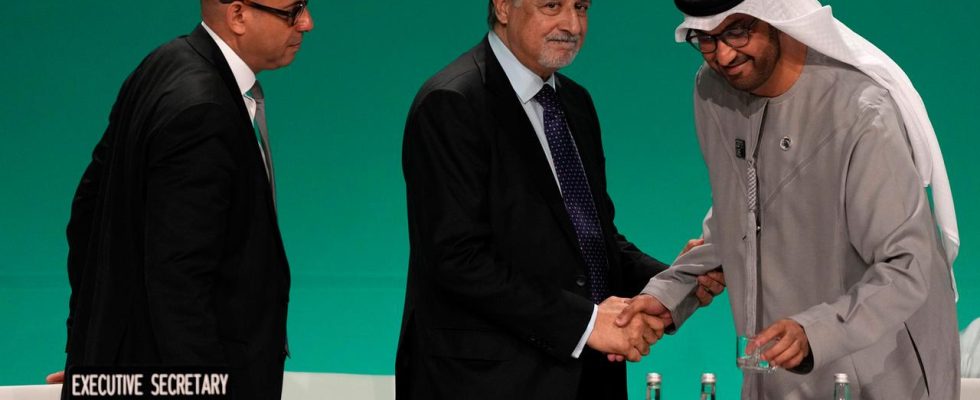For the first time, the global community is calling for a move away from fossil fuels at a UN climate conference. However, the clear exit previously demanded by more than 100 states does not appear in the final text adopted in Dubai.
The World Climate Conference in Dubai (COP28) has agreed on a final declaration. For the first time, it calls for a move away from fossil fuels.
Conference President Sultan Ahmed al-Jaber spoke of a “historic package”. It is a robust action plan to keep the 1.5 degree target within reach. This refers to the internationally agreed goal in 2015 of limiting global warming to 1.5 degrees compared to pre-industrial times. Many climate experts and environmentalists had previously questioned this.
With the compromise decision, the negotiators had shown “flexibility” and put “common interests ahead of their own interests,” al-Jaber said.
Moving away from fossil fuels
The text calls for a tripling of global renewable energy capacity by 2030 and a doubling of energy efficiency over the same period. But it also contains references to “transitional energies” such as natural gas and the controversial technologies for capturing and storing CO2.
The 21-page paper calls on countries to move away from fossil fuels in their energy systems. More than 100 countries had previously called for more extensive wording, namely a phase out. This is not explicitly mentioned.
The text of the conference presidency from the United Arab Emirates was published in the morning and adopted in plenary just a few hours later.
Guterres welcomes decision
UN Secretary-General António Guterres reacted cautiously to the decision. “Science tells us that limiting global warming to 1.5 degrees without phasing out fossil fuels is impossible. This was also recognized by a growing and broad coalition of countries at COP28,” Guterres wrote on X. “This The fossil fuel era must end – and it must end with justice.”
UN climate chief Simon Stiell praised the decision as a step in the right direction – but it wasn’t quite enough. The meeting had to send a signal to put a hard stop to humanity’s central climate problem, fossil fuels and their pollution that is burning the planet, he said. “While we have not ended the fossil fuel era in Dubai, this outcome is the beginning of the end.”
At the same time, after the heated debates of the past two weeks, he pointed out the difficulty of achieving consensus among all governments. All parties would have to agree on every word, every comma, every point. “It’s not easy, not easy at all.”
Federal Government stands behind the decision
The federal government expressly supported the decision. Foreign Minister Annalena Baerbock said it was a “huge weight off her mind,” said the German delegation. “The German delegation and the Foreign Minister are very happy that the world has decided to end the fossil fuel age.”
The EU expressed satisfaction. “For the first time in 30 years, we could now be reaching the beginning of the end for fossil fuels,” said EU Climate Commissioner Wopke Hoekstra. Environmental and development organizations described the agreement as a significant improvement over the previous vague draft and an “important signal”, but criticized it as insufficient.
French Energy Transition Minister Agnès Pannier-Runacher spoke of a “victory of multilateralism and climate diplomacy”.
USClimate Officer would like clearer wording
The US climate representative John Kerry was satisfied and grateful about the decision – even if his government would have liked clearer wording in the final text. But in view of the wars in Ukraine and the Gaza Strip as well as other challenges around the globe, the almost 200 states came together in the spirit of multilateralism and tried to define the common good. “This is the most difficult thing in diplomacy. It is the most difficult thing in politics,” he said in Dubai.
Kerry announced together with the Chinese delegation that both countries want to update their long-term climate protection strategies again. China and the USA are the two largest emitters of climate-damaging greenhouse gases.
Island states feel ignored
The island states, which are particularly threatened by rising sea levels, feel ignored. A Samoa representative told the plenary session in Dubai that the group of island states had yet to coordinate and were not in the room in time to take a position.
“We cannot return to our islands with the message that this process has betrayed us,” said the representative of Samoa. “The course correction we needed has not been achieved.”
Extension due to dispute over oil, gas and coal
The summit was extended, among other things, because of the dispute over an exit from oil, gas and coal. The conference was actually supposed to end on Tuesday.
The draft resolution, which the Emirati COP presidency initially presented on Monday, was rejected by a large majority, including the EU. He only envisaged a “reduction” in the extraction and use of fossils.
Werner Eckert, SWR, currently Dubai, tagesschau, December 13th, 2023 8:40 a.m

